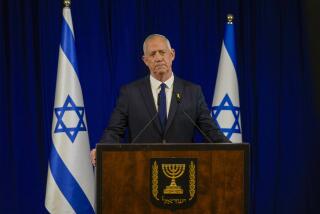British Laborite Quits Key Post, Denounces Kinnock
- Share via
LONDON — The abrupt resignation Tuesday of a senior member of the opposition Labor Party’s “shadow cabinet” threw the party into further disarray and appeared to leave Prime Minister Margaret Thatcher more firmly in command than ever.
Denzil Davies, Labor’s chief spokesman on defense affairs for four years, bitterly denounced party leader Neil Kinnock as he resigned. Without advising Kinnock, Davies, 49, called a domestic news agency reporter after midnight and told him he was leaving his post.
“I am fed up with being humiliated by Neil Kinnock,” the reporter for the Press Assn. quoted Davies as saying. “He never consults me on anything.”
Political observers could not recall a precedent for the action, which lacked the gentlemanly restraint that generally has been valued in British politics. Largely because of the increasingly bitter divisions among Thatcher’s political opponents, the prime minister remains one of the most secure elected leaders in Europe one month into her 10th year of power.
Indeed, opponents have been too preoccupied fighting among themselves to mount a serious challenge to Thatcher’s leadership despite the controversy that surrounds her aggressive style and radical program of reforms.
Davies apparently was moved to resign by remarks Kinnock made recently in a television interview that seemed to signal the end of the Labor Party’s advocacy of unilateral nuclear disarmament.
“There is no need now for a something-for-nothing unilateralism,” Kinnock said in the interview with the British Broadcasting Corp. last week.
Kinnock said that progress in arms control and a warmer East-West climate necessitates a change in party policy, a statement that angered members of Labor’s powerful left wing, who consider the commitment to scrapping Britain’s modest nuclear deterrent an article of faith.
Kinnock’s endorsement of that position helped unify the party in last year’s election campaign. But it also was a key reason for the party’s disastrous showing at the polls.
Opinion surveys have consistently found Labor’s stance on nuclear weapons to be unpopular. A survey conducted recently by Market and Opinion Research International found that two thirds of those who responded felt that Britain’s nuclear force should be maintained for at least 10 more years.
“The British public favors strong defense,” noted Peter Hutton, a director of the research firm who helped compile the survey. “It’s more that, than any love of nuclear weapons.”
Kinnock’s television comments also came amid a major Labor Party policy review aimed at enhancing the party’s appeal to the middle ground of British politics.
Kinnock quickly named Martin O’Neill, 43, who represents a district of Scotland in Parliament, to replace Davies as the “shadow cabinet’s” defense secretary. Labor’s left wing has declared that it will challenge Kinnock’s leadership at the party conference in October. Anthony Wedgwood Benn, a former Cabinet minister and longtime champion of the left, has announced that he will be a candidate for the leadership.
More to Read
Sign up for Essential California
The most important California stories and recommendations in your inbox every morning.
You may occasionally receive promotional content from the Los Angeles Times.













